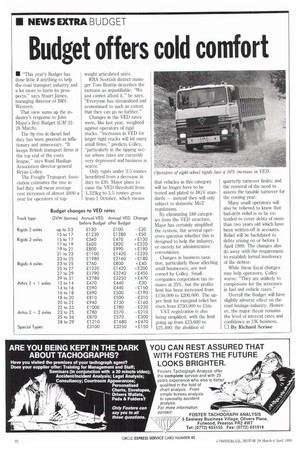Budget offers cold comfort
Page 24

If you've noticed an error in this article please click here to report it so we can fix it.
• This year's Budget has done little if anything to help the road transport industry and a lot more to harm its prospects," says Stuart James, managing director of BRS Western.
That view sums up the industry's response to John Major's first Budget (CM 2228 March).
The 9p rise in diesel fuel duty has been greeted as inflationary and unnecesary. "It keeps British transport firms at the top end of the costs league," says Road Haulage Association director-general Bryan Colley.
The Freight Transport Association estimates the rise in fuel duty will mean average cost increases of almost £800 a year for operators of top
weight articulated units.
RHA Scottish district manager Tom Brattin describes the increase as unjustifiable: "We just cannot afford it," he says. "Everyone has streamlined and economised to such an extent that they can go no further."
Changes in the VED rates were, like last year, weighted against operators of rigid trucks. "Increases in VED for larger rigid trucks will hit many small firms," predicts Colley, "particularly in the tipping sector where rates are currently very depressed and business is scarce."
Only rigids under 3.5 tonnes benefitted from a decrease in duty to £30. Major plans to raise the IIED threshold from 1,525kg to 3.5 tonnes gross from 1 October, which means that vehicles in this category will no longer have to be tested and plated to HGV standards — instead they will only subject to domestic MoT regulations.
By eliminating 188 categories from the VED structure, Major has certainly simplified the system, but several operators question whether this is designed to help the industry, or merely for administrative convenience.
Changes in business taxation, particularly those affecting small businesses, are welcomed by Colley. Smallcompanies corporation tax remains at 25%, but the profits limit has been increased from £150,000 to 2200,000. The upper limit for marginal relief has risen from £750,000 to Elm.
VAT registration is also being simplified, with the limit going up from £23,600 to £25,400; the abolition of quarterly turnover limits; and the removal of the need to assess the taxable turnover for the coming year.
Many small operators will also be relieved to know that bad-debt relief is to be extended to cover debts of more than two years old which have been written-off in accounts. Relief will be backdated to debts arising on or before 1 April 1989. The changes also do away with the requirement to establish formal insolvency of the debtor.
While these fiscal changes may help operators, Colley warns: They are unlikely to compensate for the increases in fuel and vehicle taxes."
Overall the Budget will have slightly adverse effect on the road haulage industry. However, the major threat remains the level of interest rates and confidence in UK business. LI By Richard Scrase




































































































































































